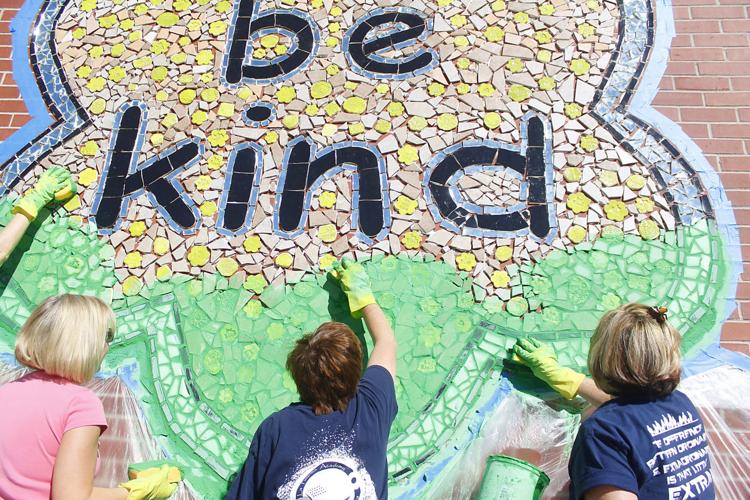We asked some local organizations for their ideas about what the community could gift to Tucson for the city's 241th birthday on Saturday, Aug. 20, 2016.
Shop local and support Tucson's economy
Erika Mitnik-White is the Southern Arizona director of the nonprofit Local First Arizona, and is also a member of Tucson's Commission for Food Security, Heritage and Economy. A University of Arizona graduate, she has lived in Tucson since 1987.

Yee Huang surveys her options at Antigone Books, 411 N. Fourth Ave. The store has been involved with Independents Weeks since the effort launched 11 years ago, encouraging Tucsonans to shop at locally owned stores when possible.
"Wish Tucson a happy birthday by making the choice to buy local! When you support our locally-owned businesses, you help grow the success of Tucson. Buy local and more jobs and dollars stay right here. For about every $100 that gets spent, about $43 sticks around and recirculates when you choose local. Choose a national chain and only $13 stays here, as most of those dollars head out of town and back to the head office. Not to mention our local businesses are the ones most likely to support our local charities and create more job opportunities by hiring other local businesses. Plus our local businesses are awesome! They’re run by our friends and neighbors who care about what happens in Tucson because it’s their home too. If everyone in Tucson switched up as little as 10 percent of their spending to local, we’d have 1,600 new jobs, $50 million in new wages and $137 million in new economic activity by the time Tucson’s next birthday comes around. Switching is easy. Think about three ways you could switch to local in your routine. Tucson’s birthday is the perfect time to revisit that 'we should go to' place. You know the one. You were probably talking about it just the other day. That local place you love but somehow haven’t visited in over a year. It’s the spot to celebrate, so head on over, and wish Tucson a very happy birthday while you’re there."
Give thanks by helping someone in need
Michael McDonald is the director of The Community Food Bank of Southern Arizona, which fights hunger by distributing over 63,000 meals per day, in addition providing food-related education and economic opportunities for the less fortunate.

Antonio Lopez, right and Enrique Hernandez, work together to saran wrap a cart with prepped chicken in the Community Food Bank of Southern Arizona kitchen.
"Every person ― no matter what their circumstance ― hungers for something, whether it's food, economic opportunity, or the chance to make a difference. We at the Community Food Bank of Southern Arizona have been 'feeding' all of these hungers for the past 40 years, here in five Southern Arizona counties. In the past 12 months alone, 187,000 neighbors-in-need have been assisted by another 12,000 neighbors donating their time, talent, and/or treasure. These folks overwhelmingly proclaim that they receive much more than they give. And isn't this the utterly miraculous and transformative nature of the human spirit: our ability to choose to rise above today's cultural norms of self-centeredness, small-minded skepticism, and small-hearted fear and cynicism, and extend an open hand to one another in kindness and solidarity. After all, who among us, when we keep our ego in check, can claim that we've 'earned' the gift and blessings of our life? At the end of the day, each of us are needy people and each gifted people, one and the same. As we celebrate the anniversary of our community's life together, let's each express our gratitude for our unearned blessings by helping our neighbors-in-need and sharing our diverse gifts with one another."
Create micro-moments of intentional kindness
Jeannette Maré is the founder and executive director of Ben's Bells, an organization with a mission to educate and motivate people to realize the impact of intentional kindness. It is known for recognizing people of the community who spread kindness each week and for distributing handmade bells around the city to be found by passersby as a reminder to be kind.

Kathleen Phillips, Debbie Childress, and Karen Crandall help fill in the green grout to the new Ben's Bells mural in front of La Paloma Academy on Friday November 7, 2014. La Paloma Academy is participating in 1,000 acts of kindness in partnership with Ben's Bells.
"This summer marks 40 years since my family arrived in Tucson after a thousand-something mile drive from Iowa. My dad turned down a job at Cornell to take one at U of A and Tucson became my home. I love it here. And when my world fell apart after the death of my little son, this community rallied around my family and turned our modest offering – Ben’s Bells – into a movement. I don’t think Ben’s Bells would have taken off like this in any other place. So, as a way of celebrating the birthday of our beloved city, I’d like suggest a gift we can give every single day: micro-moments of intentional kindness.
It is easy to feel disconnected in our daily lives. But one way that we can feel more connected in our community is to focus on the small, yet meaningful, positive interactions that we can have every day. Training our brains to focus on what psychologist and researcher Barbara Frederickson calls “micro-moments” of connection changes the way our brain works and helps us feel deeply embedded in our families, schools, workplaces, neighborhoods, and communities. A “micro-moment” of connection with others, like sharing a smile or expressing concern, improves emotional resilience, boosts the immune system, and reduces susceptibility to depression and anxiety.
So, instead of thinking that you have to make a grand gesture in order to make our city healthier, know that each micro-moment of intentional kindness serves to create the foundation that supports all of us."
Treasure teachers, neighborhood schools
Katie Rogerson is the director of Tucson Values Teachers, an organization that works to foster and encourage the collaboration, optimism and support necessary to retain, recruit and reward K-12 teachers who play a central role in our region's economic and civic prosperity.

Teacher Faith Mortensen high-fives Patrick Davis, 6, who has correctly shown on the board how he got to school on July 19, his very first day at Sycamore Elementary School in Corona de Tucson on July 19, 2004.
"The best birthday gift any Tucsonan can give is one that benefits us all, now and 241 years into our future. That gift is quality education for ALL children. When we come together to support and empower teachers, to make sure that every child has the opportunity to learn and succeed in school, and to build a strong, well-funded educational foundation that strengthens our economy as well as our schools, we all win. Tucson wins. And there are plenty of ways Tucsonans can give this gift. We can vote, we can make sure teachers receive the respect and appreciation they deserve, we can give our time, talent, and treasure at our neighborhood schools. This is a gift that we give ourselves and to our future. It’s the gift that keeps on giving."
Make Tucson peaceful, friendly
Barbara Eiswerth, PhD, is the founder and director of Iskashitaa Refugee Network, which works to help refugees become self-sufficient through its food-based programming. It gleans and redistributes more than 50 tons of produce annually to help those in need.

The Iskashitaa Harvesting Network helps refugees. Here, refugees share a meal with Tucsonans.
"If we someone dressed in traditional dress or anyone that looks like they are from a different culture walking down a Tucson avenue, give a smile and/or say hello. Yes, looks can be deceiving but being welcoming is so important and kindness never hurts.
Iskashitaa Refugee Network meets UN refugees at their entry point, whatever that is. We focus on the universal aspect and common denominator of food, local food and teach our “new citizens to be” what grows local.
We harvest over 50 tons of fruit from Tucson’s backyard bounty, and we share that bounty with neighbors and area food banks. We embrace the cross cultural lessons experienced during harvesting, edible tree tours, and food preservation workshops to make a lot of smiles and a wide array of local fruit preserves, marmalades, chutneys syrups, breads, desserts, and sauces.
Tucson can honor long standing edible trees and their delicious fruit by stopping the rampant food waste in our neighborhoods. Volunteer to help feed a family instead of filling our landfills. Eat local, shop farmer’s markets, use whatever talents and energy you have to make Tucson peaceful, friendly, and open to UN refugees who have survived war, genocide, fear of persecution or torture. These refugees are giving back through Iskashitaa Refugee Network to help themselves during difficult times of adjustment, but also lending a hand to Community Food Banks. Wasting fruit is wasting our precious desert waters, so slowing food waste would be a Happy Birthday for Tucson."
Get your hands dirty
Chad Borseth is the retail manager for the nonprofit seed conservation organization Native Seeds SEARCH.

Chad Borseth, manager of Native Seeds SEARCH (Southwest Endangered Aridland Resources Clearing House), helps Wanda Cerniglia get the right seeds for growing vegetables in the desert.
"Say happy birthday Tucson by planting native wildflowers for our desert critters to enjoy. With humans taking up more real estate in the Tucson valley it is important to plant things for our desert pollinators and other wildlife. Flowers like desert marigold, globemallow, and lupine not only provide food for our wild residents, but also beautify our desert landscape. If growing things is not your bag, you can give back to Tucson by supporting its many local food producers and artists."
Help refugees become productive citizens
Tilahun Liben is a former refugee from Ethiopa who is now a board member and ethnic community organizer for Iskashitaa Refugee Network.
"When the refugees arrive in Tucson the communities empower them by showing them how to adjust in Tucson. The refugees come here from a different culture and way of living. Learning the new culture is confusing. Communities must work on this to make the refugee productive citizens for themselves and for the city.
Refugees pass through the hardship of life, they know they deserve life. They know how to survive challenge and change it in life. When the communities dedicate work on the refugees our Tucson view change. The mass media also play important role to change the communities attitude for the refugee well being and also for Tucson.
I wish you Tucson to be productive, the place to live harmonious, all people respect each other and help each other, and working together to change the environment. That's my gift Tucson for you, I welcome refugees through Iskashitaa Refugee Network. Happy Birthday Tucson."










